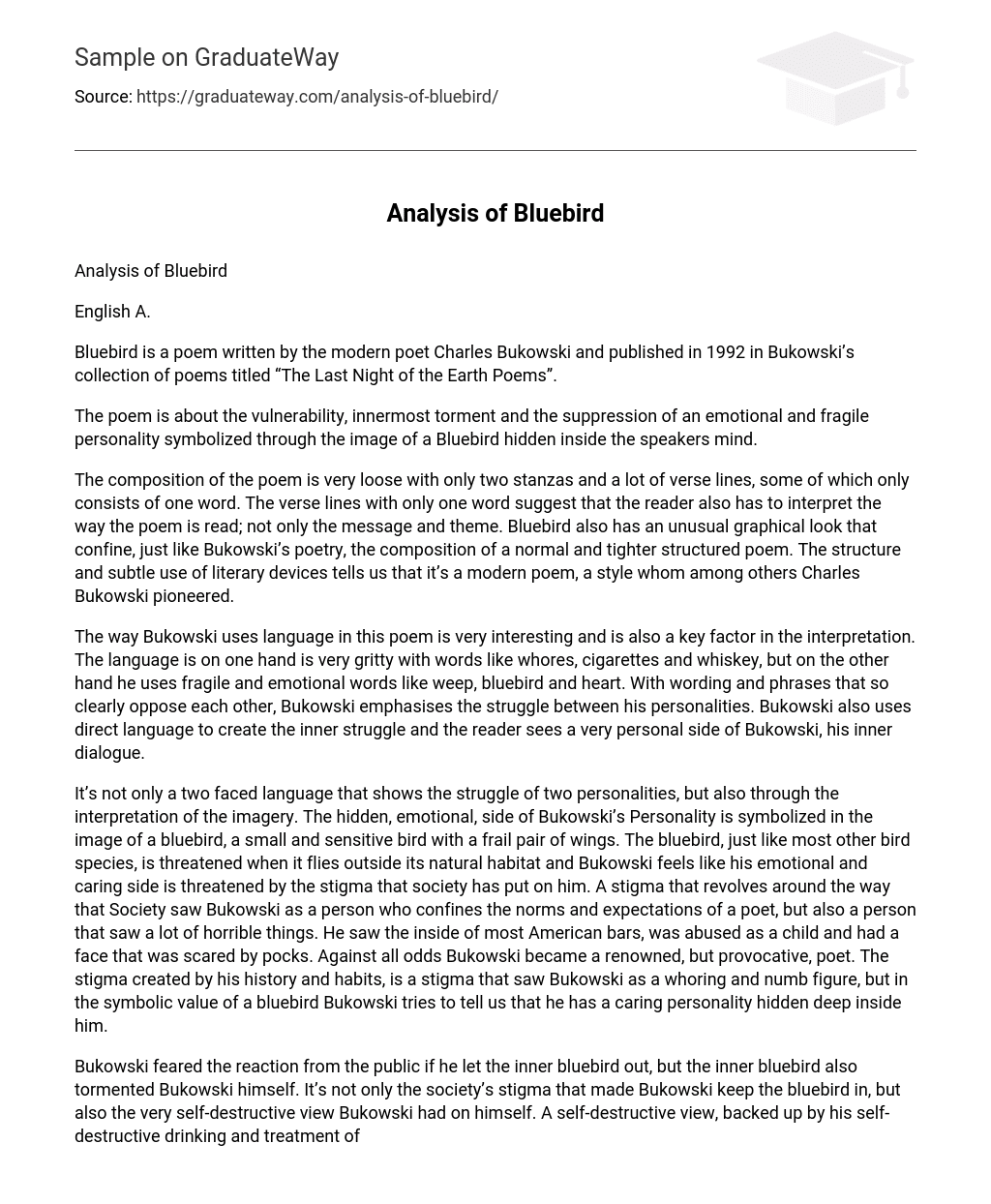Bluebird is a poem written by the modern poet Charles Bukowski and published in 1992 in Bukowski’s collection of poems titled “The Last Night of the Earth Poems”. The poem is about the vulnerability, innermost torment and the suppression of an emotional and fragile personality symbolized through the image of a Bluebird hidden inside the speakers mind.
The composition of the poem is very loose with only two stanzas and a lot of verse lines, some of which only consists of one word. The verse lines with only one word suggest that the reader also has to interpret the way the poem is read; not only the message and theme. Bluebird also has an unusual graphical look that confine, just like Bukowski’s poetry, the composition of a normal and tighter structured poem. The structure and subtle use of literary devices tells us that it’s a modern poem, a style whom among others Charles Bukowski pioneered.
The way Bukowski uses language in this poem is very interesting and is also a key factor in the interpretation. The language is on one hand is very gritty with words like whores, cigarettes and whiskey, but on the other hand he uses fragile and emotional words like weep, bluebird and heart. With wording and phrases that so clearly oppose each other, Bukowski emphasises the struggle between his personalities. Bukowski also uses direct language to create the inner struggle and the reader sees a very personal side of Bukowski, his inner dialogue.
It’s not only a two faced language that shows the struggle of two personalities, but also through the interpretation of the imagery. The hidden, emotional, side of Bukowski’s Personality is symbolized in the image of a bluebird, a small and sensitive bird with a frail pair of wings. The bluebird, just like most other bird species, is threatened when it flies outside its natural habitat and Bukowski feels like his emotional and caring side is threatened by the stigma that society has put on him. A stigma that revolves around the way that Society saw Bukowski as a person who confines the norms and expectations of a poet, but also a person that saw a lot of horrible things. He saw the inside of most American bars, was abused as a child and had a face that was scared by pocks. Against all odds Bukowski became a renowned, but provocative, poet. The stigma created by his history and habits, is a stigma that saw Bukowski as a whoring and numb figure, but in the symbolic value of a bluebird Bukowski tries to tell us that he has a caring personality hidden deep inside him.
Bukowski feared the reaction from the public if he let the inner bluebird out, but the inner bluebird also tormented Bukowski himself. It’s not only the society’s stigma that made Bukowski keep the bluebird in, but also the very self-destructive view Bukowski had on himself. A self-destructive view, backed up by his self-destructive drinking and treatment of his own body. “ there’s a bluebird in my heart that/wants to get out/but I’m too tough for him,/ say, stay in there, I’m not going/to let anybody see you.”
He tries to suppress the bluebird’s existence through means of denying it, using escapist techniques such as drinking, smoking and participation in prostitution to deter his mind from the presence. “there’s a bluebird in my heart that/wants to get out/but I pour whiskey on him and inhale/cigarette smoke/and the whores and the bartenders/and the grocery clerks/never know that/he’s/in there” Only in moments of total solitude, in his bed, he lets his little bluebird out of it solitary confinement, and let him sing a little. He shows that it’s in all of us, some are just better at hiding it. I don’t think the message that Bukowski tries to send is a message to reader as much as it is a statement. A statement, in which Bukowski tells society and himself that even through all the drinking and whoring, he had a softer side.





